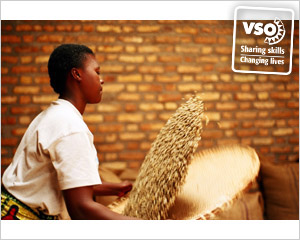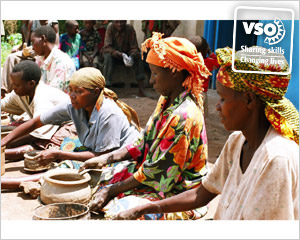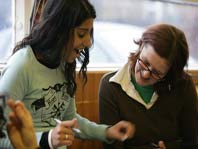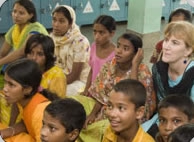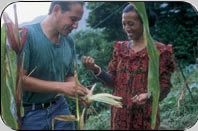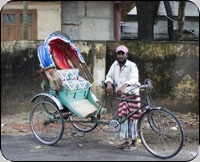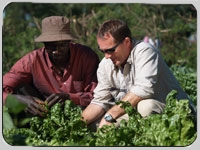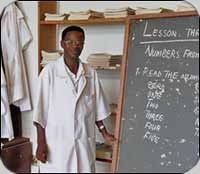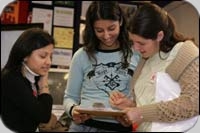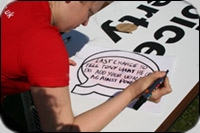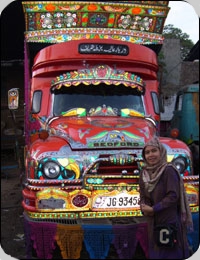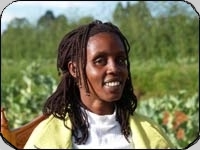FAQs
1. What kind of volunteer placements does VSO offer?
Volunteer Placements are for skilled and experienced professionals. In Romania, VSO presently recruits communications, management, health, education, IT, social research and agriculture professionals, as well as various NGO workers. These placements are open to volunteers aged between 20 and 75 (currently the average age of VSO UK volunteers is 40). Standard placements last from 1 to 2 years, with the majority of placements lasting for 2 years. You’ll need a professional qualification in your field and generally a minimum of 2-5 years’ post-qualification experience. If you have over 5 years of very specific experience, including consultancy experience and international exposure, there might be some short-term specialist assignments available as well (1 to 6 months, depending on the task). Requirements for these placements are highly specific, to ensure that you you'll be able to make an impact in a matter of months.
2. How do I find out if my professional skills are needed?
To find out if your skills are in demand for VSO Volunteer Placements, check out here and on www.vso.org.uk for the latest updates and register your interest online.
3. How long does a VSO placement last?
Volunteer jobs last for 1-2 years, with the majority of placements lasting 2 years. If you have the experience and skills to make an impact in a matter of months, there might be some short-term assignments available for you.
4. Which countries does VSO work in?
VSO currently works in 40 countries, primarily in Africa and Asia. Click here for an up-to-date list.
5. Can I apply to work in a specific country?
Usually not. We recruit volunteers to a common pool, rather than for specific jobs. We then match our volunteers to placements where their skills can be most effectively used to achieve sustainable development. We do of course take your preferences into consideration but we ask volunteers to be as flexible as possible.Once the selection is over and we start matching you to a suitable placement, you will also be usually offered 2-3 options to choose from. VSO works in those areas where security risks are unlikely. In this way we hope that our volunteers will have the best prospect of contributing to sustainable development. You will not be asked to work in any area where there is immediate danger from war, civil unrest or natural disaster.
6. Can I apply for a specific placement displayed in this website?
Generally we recruit volunteers to a pool, rather than for specific jobs. The reason is the high volume of applicants world-wide who are being continuously matched to these volunteer jobs. We then match our volunteers to placements where their skills can be most effectively used to achieve sustainable development. There are some job descriptions posted on this website: these are real volunteer job positions meant to give you an idea of what your work as a VSO volunteer could be, but they are displayed for sample purposes only. However, you can also find some urgent placements on www.vso.org.uk that you can apply for directly.
7. Can I volunteer with my partner and/or children?
VSO can place volunteering couples and families in Volunteer Jobs and we do have many couples and a small number of families overseas. However, options can be more limited. This section outlines VSO policy and the different options for volunteering with a partner or family:
Couples where both partners are volunteers: If you and your partner work in similar fields such as medicine, the chances of finding two placements in the same location are increased. However, it can be more difficult to place a couple with very different skills in the same region or even the same country! In this case, matching you both to suitable placements could take a very long time. Your prospects of going overseas are much better if one of you goes as a volunteer and the other as a non-volunteering partner. If you would like to bring your partner along as a volunteer, please let us know early on (you will need to apply together).
Couples where a volunteer is accompanied by a non-volunteering partner: We can’t provide financial support for partners of VSO volunteers who are not themselves VSO volunteers, but we do provide health insurance and medical support. But there are a few other financial and practial implications to consider before you decide to apply:
- In many countries, it is difficult for non-volunteering partners to obtain a visa, especially if you are not married.
- Paid work opportunities for non-volunteering partners are often non-existent. However, there will be plenty of opportunities for voluntary work.
- Due to limited resources accommodation may be suitable only for one person (the volunteer).
- National laws and/or cultural norms can make it difficult to place unmarried or same-sex couples.
Volunteers with dependent children: Placing volunteers with dependents can be difficult. The constraints are similar to those facing couples, as outlined above. Even where it is possible, taking children to a placement can present many additional practical difficulties. Education and childcare are often expensive overseas. Access to medical facilities can be limited and the quality of health care is not comparable to that available for children in a developed country. If you feel that you have considered all the implications of taking children to a placement, we’re happy to consider your application.
8. I am retired. Can I still volunteer with VSO?
Yes, you can. A number of volunteers choose to do VSO after retirement, and we welcome applications from experienced professionals up to the age of 75. Older volunteers are valued by local employers for their patience, self-assurance and resourcefulness, as well as their professional skills.
For most jobs you’ll need to have recent work experience, or have kept up with developments in your skill sector. All volunteers, whatever their age, will be asked for medical information when they apply and if necessary will need clearance from our medical unit before they can volunteer. We do successfully place older volunteers, but the retirement age, visa policies and cultural norms of the countries we work in can sometimes limit the number of opportunities available to you.
9. What personal and financial support will I get from VSO?
Financial Support: VSO volunteers receive travel costs such as flights, health insurance and a Volunteering Allowance whilst overseas, paid at intervals. The Volunteering Allowance covers local day-to-day living expenses, as well as costs incurred in the home country such as preparation costs and some social contributions.
Personal Support: Before you go overseas we’ll provide extensive training to prepare you for the changes that you will experience and for your work in development. Once overseas, your local VSO office will meet you on your arrival and organise further training and briefing. Your most regular contact will be with your employer and they act as your primary means of support. Your local VSO office will help with major personal, medical or security problems.
Professional Support: Volunteer work is often looked upon as 'time out' of your career. However, the professional nature of our jobs means that VSO is a career choice. We take your professional development seriously and you will have specific job-related materials available to you online, on VSO's password-protected website section, as well as at VSO Learning Centre in Birmingham which you will visit during your pre-departure training sessions. Your overseas employer might also provide you with professional support and guidance, complemented by conferences, workshops and distance learning.
10. How do I apply?
Please go to www.vso.org.uk and use the online mechanism for registering your interest with VSO. Before you apply, please make sure that you have read through the information and conditions available on that website.
11. The Volunteer Journey – what is the process from application to placement?
Please go to the Application Procedure section and read through the steps detailed there.
12. Can I speak to a returned volunteer?
If you apply to VSO and you are selected to volunteer, we'll give you a contact list of returned (mostly British) volunteers from your professional area, so that you can fully brief yourself before you go on your placement.
13. What Financial Support will I get from VSO?
VSO's financial package for volunteers is detailed here.
14. What happens to my pension scheme while I’m away?
In order to ensure the continuity of your pension scheme, you are advised to make the necessary arrangements in your home country with the relevant authorities and/or pension fund. VSO offers its volunteers a financial support package which should also cover your pension contribution expenses within reasonable limits in your home country, while you are away. Please note that VSO will not be able to pay for your pension contributions on your behalf while you are away, so you will need to make necessary arrangements before leaving. This might mean signing an individual contract with the relevant authority and either paying in advance, or arranging with a friend or family member to make the monthly payments for you.
15. I may need a ‘No Criminal Convictions Letter’ to apply for employment when I return home. Can VSO provide this?
On your return, you might apply for a job that requires confirmation of good conduct while you were in your placement country. Where appropriate, Returned Volunteer (RV) Programmes will provide a letter stating that, to the best of VSO’s knowledge, there are no criminal convictions or proceedings pending from your time in placement. This is usually accepted. However some organisations, particularly those that work with children, insist on a letter from the local police in a volunteer’s placement country. Furthermore, some embassies require a letter from the police before issuing a residency visa. It can be practically impossible to obtain this document once you have returned home. If you think you might need this document at some point in the future, do try to obtain it from the local police before you leave.
16. I am HIV positive. Can I volunteer with VSO?
Being HIV positive need not be a barrier to volunteering with VSO. In terms of medical clearance for an overseas placement, we would aim to assess individuals living with HIV in the same way as other chronic medical conditions. We would want to ensure that you go to volunteer in an area which would not pose high risks to your health, and where good medical facilities are available for any follow up checks or treatment you might need. Please note that we work in some countries where it is illegal to enter and/or stay in the country if you are HIV positive. In some countries there may also be a stigma against people with HIV. You’ll need to consider the implications of this when deciding to accept a volunteer job.
17. I have a disability. Can I volunteer with VSO?
We’re committed to investigating every possible option to enable disabled people to volunteer. We ask you to tell us about your disability on your application form. When you apply, a VSO placement adviser and our UK medical unit will work closely with you. He or she will identify jobs that would be suitable for you before you come to assessment. Some of the environments we work in are challenging. It may be difficult for us to match your professional and personal circumstances with a volunteer job. We'll make every effort to consider all possibilities and think flexibly to prevent this. You can request volunteering information in a range of different formats, eg Braille, large print, and audiocassette. A reader and writer service is available. Sign language interpreters can be provided.
18. I have a health problem. Can I volunteer with VSO?
Having a current or previous health problem does not automatically mean that you cannot be considered as a potential volunteer. However, overseas VSO placements may be in challenging environments, with limited local medical facilities. It is important that you’re in good physical and mental health when you apply to VSO. Any chronic medical condition should be well controlled and such that you would not require frequent on-going medical attention while overseas. We would encourage you to consider the implications of volunteering overseas on your health. If you have a significant medical condition, you should be prepared that there may be some difficulty in finding an overseas placement which we feel would not adversely affect your health, and which can provide an appropriate level of medical support. Unfortunately, in some cases, your options for working overseas with VSO may be limited because of health issues.
19. What if I get sick while I’m on my volunteer placement?
Your health and well-being are important to VSO. VSO has comprehensive medical insurance and procedures put in place for all its volunteers. During your placement, you will normally consult local doctors about health problems. Each VSO programme office has an appointed medical adviser, usually a local doctor or nurse, whom you can consult (contact details will be provided during your in-country training). You will also receive the programme office’s emergency contacts and medical emergency procedures, together with a list of recommended doctors, clinics, dentists and pharmacies in your region. If a decision is made to evacuate you for medical reasons, VSO can call on the best available emergency services to evacuate you to a hospital with better facilities. This may not be to your recruitment country. All volunteers are covered for medical repatriation except for medical emergencies resulting from hazardous sports. Please note: VSO’s medical insurance policy requires you to have medical clearance from your family doctor and to take the preventative measures we advise, for example, against malaria.
For more up-to-date information please check www.vso.org.uk.


